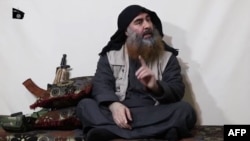For Abu Bakr al-Baghdadi, the high point of his life may have come in 2014, when he stood in a flowing black robe before worshippers in a mosque in Mosul, the northern Iraqi city Islamic State had captured, and declared that he was the caliph, the political and religious leader of the global Muslim community.
“I was appointed to rule you but I am not the best among you," Baghdadi declared. "If you see me acting truly, then follow me. If you see me acting falsely, then advise and guide me…. If I disobey God, then do not obey me.”
Other Muslim leaders rejected his claims, but his caliphate eventually covered as much as 40% of Iraq and a wide swath of northern Syria. It drew in thousands of foreign fighters to the Islamic State cause against Western and Middle Eastern allies in the region.
In its self-declared capital of Raqqa, Syria, Islamic State for a time administered its caliphate like a state, with a brutal, uncompromising system of Islamic justice, while it collected taxes and doled out public services.
But Baghdadi, with a $25 million bounty on his head since 2016, was nowhere to be seen in public, save for an 18-minute video that was released last April.
There were numerous reports over the last several years that he had been killed or seriously wounded in an array of U.S. and allied attacks throughout Iraq and northern Syria as the caliphate gradually collapsed. In June 2017, the Iraqi government declared it had recaptured Mosul from Islamic State and six months later declared complete victory in Iraq. By last March, the U.S.-backed Syrian Democratic Forces announced the liberation of Baghuz, the last Islamic State-held territory in Syria.
Baghdadi resurfaced in audio tapes, often referencing recent events to prove he was alive. Otherwise, he hid, employing an array of techniques to avoid surveillance of his whereabouts. He did not use mobile phones, often moved from one safe house to another and shunned travel in convoys that might draw attention from allied forces in the region.
But the U.S. hunt for him went on, culminating in Saturday's U.S. Special Forces raid in Syria in which Baghdadi detonated his suicide vest, killing himself and three children as the American commandos cornered him in a tunnel with no outlet.
U.S. President Donald Trump announced the raid and Baghdadi's death in a rare Sunday morning White House address and news conference, telling the world that Baghdadi's demise came as he was "whimpering, crying and screaming all the way." Within 15 minutes, in a field test, the U.S. said his DNA was confirmed.
Baghdadi was born Ibrahim Awwad Ibrahim Al-Badri in 1971 in the Iraqi city of Samarra. He was the son of a Quranic teacher.
A 2015 profile of him by the Brookings Institution think tank in Washington described him as a youth as "withdrawn, taciturn, and, when he spoke, barely audible."
But early on, the Brookings report said, "Ibrahim’s nickname was 'The Believer.' When he wasn’t in school, he spent much of his time at the local mosque, immersed in his religious studies; and when he came home at the end of the day, according to one of his brothers, Shamsi, he was quick to admonish anyone who strayed from the strictures of Islamic law."
He also loved football, referred to by others as "our Messi," after the star Argentine football player, Lionel Messi.
He studied Quranic recitation at Saddam University for Islamic Studies in Baghdad and joined the Muslim Brotherhood, a pan-Arab movement based on establishing states buttressed by Islamic law that some governments have banned.
News accounts and books have traced his radicalization back to the 2003 U.S. invasion of Iraq to topple Iraqi strong man Saddam Hussein. Baghdadi joined Sunni militias to fight the U.S. occupation. He was jailed at Camp Bucca in 2004 and made his presence known as both a preacher and a footballer.
"Many of the 24,000 inmates at Bucca were Sunni Arabs who had served in Saddam’s military and intelligence services," Brookings said. "When Saddam fell, so did they, a consequence of the American purge of the Baathists and the new ascendency of Iraq’s long-oppressed Shiite majority. If they weren’t jihadists when they arrived, many of them were by the time they left."
"Baghdadi would turn out to be the most explosive of those flames," it said, "a man responsible for much of the conflagration that would engulf the region less than a decade later."
When Baghdadi was released, he had a means for reconnecting with his fellow prisoners: they had written each others' phone numbers in the elastic of their underwear.
He established ties with al-Qaida in Iraq but many of the Bucca inmates would go on to become leading figures in an offshoot, the Islamic State in Iraq, and Baghdadi became its head in 2010 when leaders of the group were killed in an air strike.
A year later, he expanded the group into Syria as it seized more and more territory, including Raqqa and eventually Mosul in 2014, where he gave his only televised speech in the city's Grand Mosque. He spoke to Islamic State supporters in 2015, 2016 and 2017 in audio messages.
His final audio admonition to Islamic State adherents came last month.




